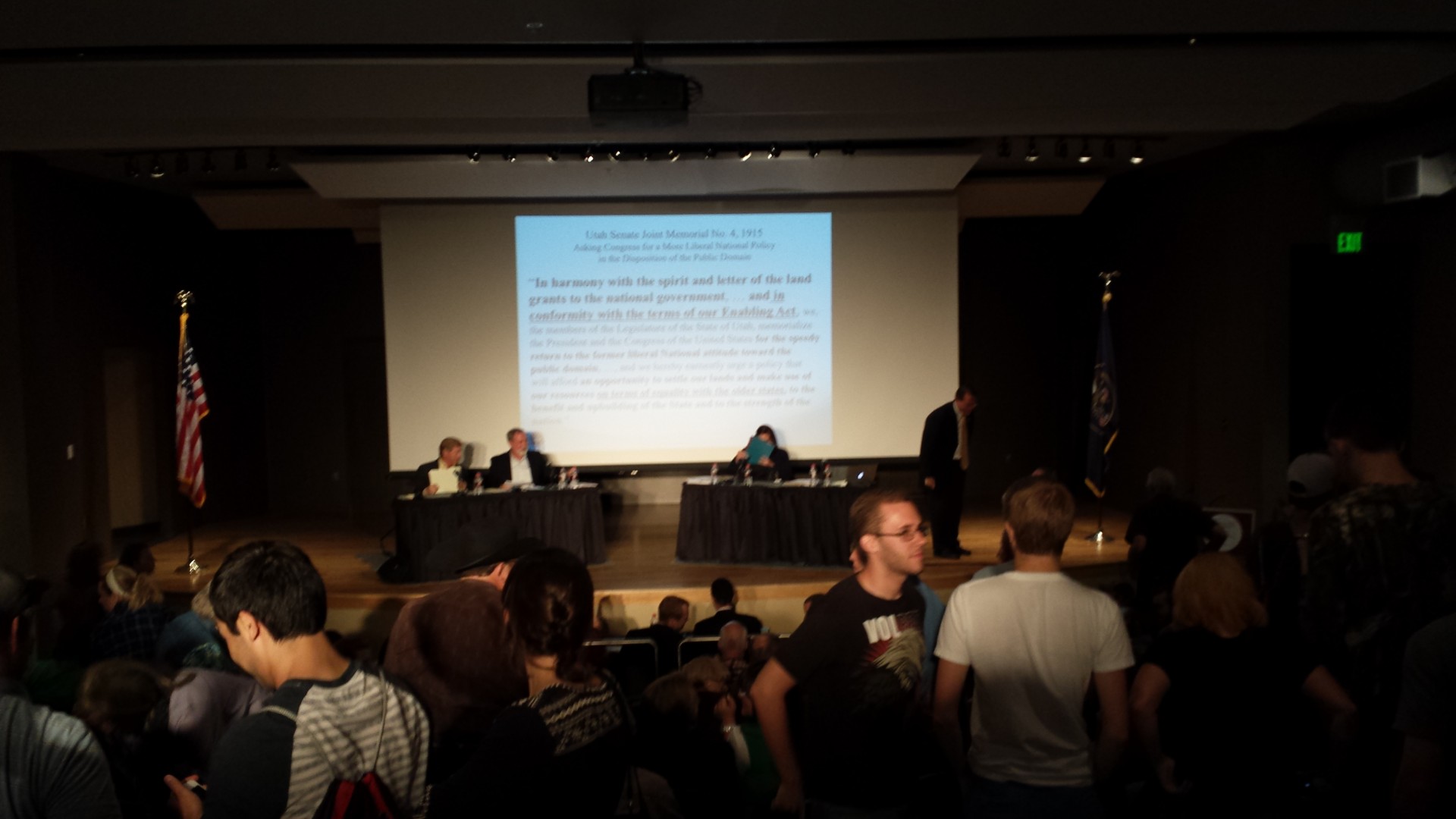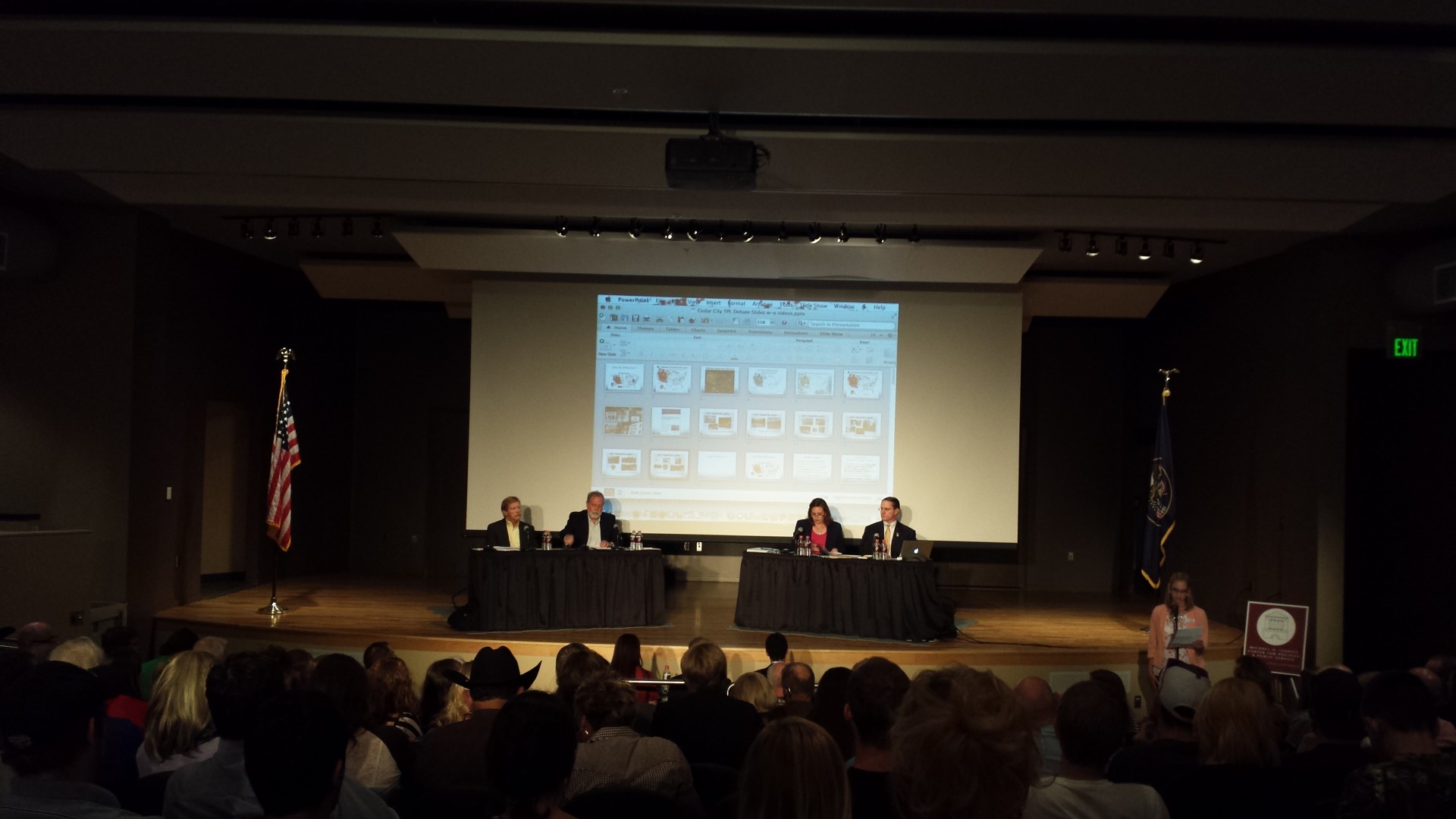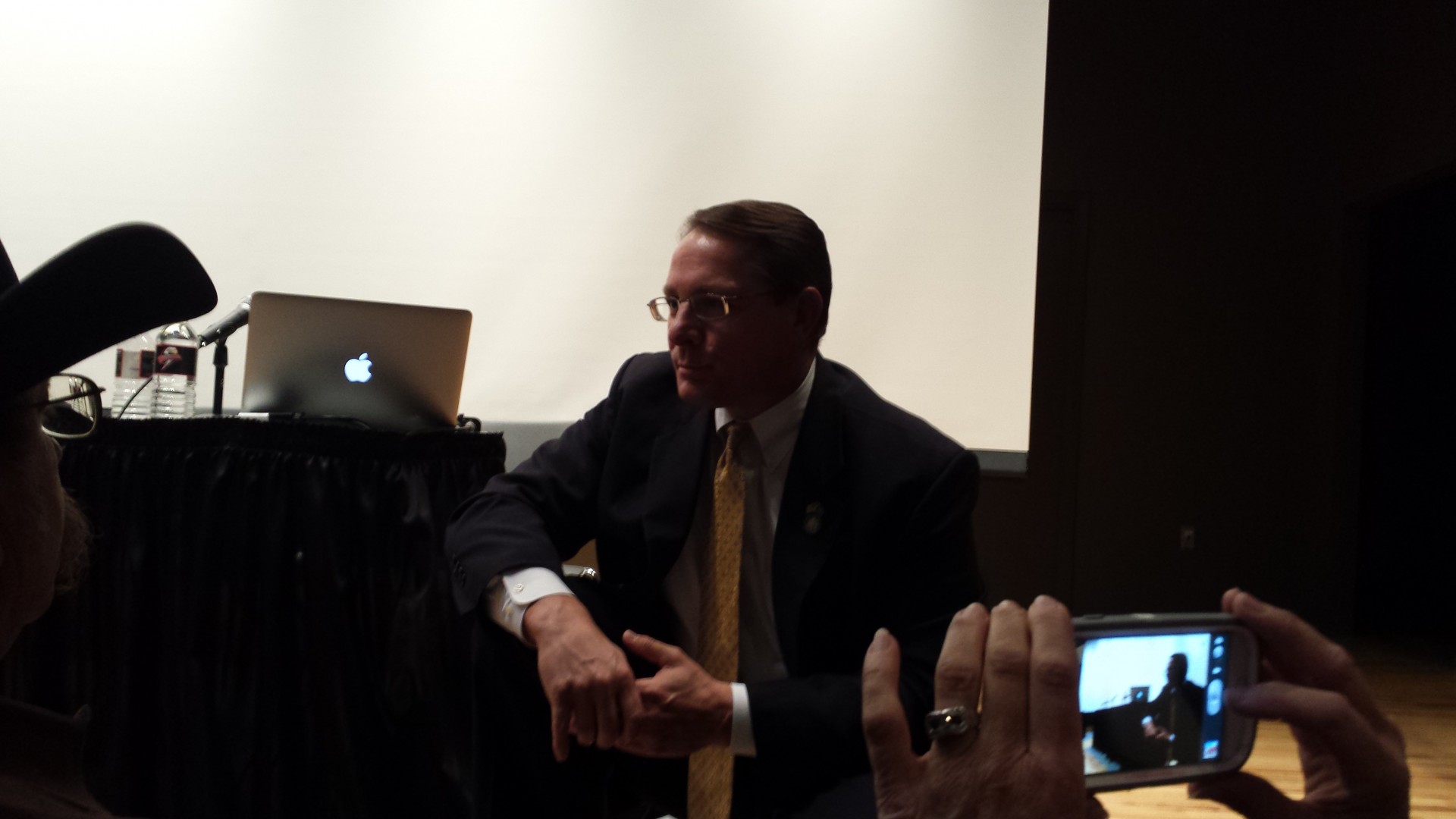
CEDAR CITY – Thursday, at the Michael O. Leavitt Center for Politics & Public Service on the Southern Utah University campus in Cedar City, state Rep. Ken Ivory and Utah House Speaker Becky Lockhart debated toe to toe on the issue of “Who should manage public lands?” with University of Utah professors Dan McCool and Bob Keiter.

In his opening statement, McCool said debating and having dialog is good; however, this particular event was not an example of that.
“There is no magic promise to hand over to the state of Utah somewhere between 20 and 30 million acres – it simply doesn’t exist,” McCool said.
He said there is a common misconception that the federal government needs to give public lands back to the state when the lands have never been in the possession of Utah. McCool said he would argue that public lands belong to all 314 million Americans.
Ivory said there is a big difference between the eastern states and the western states in how much land the federal government owns within the borders of the states. He asked the audience if they had healthier land; if they had better access to the land; is the land being used productively?
“What we are looking for is to honor the very same promises that we have stated: better access, better health and better productivity for our land,” Ivory said.
House Bill 148
The first question of the night addressed a bill, presented by Rep. Ivory and passed by the Utah Congress in 2012, that required the federal government to extinguish title to public lands and transfer title of those public lands to the State of Utah on or before Dec. 31, 2014.
The question posed was, “Why does the state feel the federal government is obligated to transfer those titles to the State of Utah?”
Ivory said “public lands” is a term used by the federal government to describe lands subject to sale or disposal and always has been. He said the Supreme Court simply holds the land in trust until the states are ultimately created. The Supreme Court has also said once the federal government has executed these trusts, the sovereignty of the states will be complete and all the states will be on equal footing.

Keiter rebutted by saying this was a legal question, not a political one, so it needs a legal answer.
He said it is true there is a disparity in ownership of public lands east and west; nevertheless, there is no legal basis for a claim by the State of Utah to these lands.
“The state’s enabling act does not displace the authority of Congress under Article 4 of the Constitution, the property clause,” Keiter said. “This point is clear in our U.S. Constitution and the state constitution. The supremacy clause makes the Constitution, and Congress’ power, supreme.”
Keiter said Congress’ property clause power is without limitation, and the equal footing doctrine spoken about by Ivory is in reference to political equality and doesn’t include economic equality or land ownership equality.
Lockhart, in her rebuttal, said she needed to address one point specifically:
Congress’ power is without limitation. I want you to think about that and what that might mean for the people of America and how concerned we should be about that.
Lockhart said the enabling acts of North Dakota and South Dakota, for example, are almost word for word the same as Utah’s; however, North and South Dakota are only 3.9 percent and 5.4 percent comprised of public land, while Utah is 66.5 percent public land. That is not equal footing, Lockhart said, and it is not equal protection.
Who is in a better position to manage Utah land?
McCool said public lands belong to all of the American people and, on the whole, federal agencies do a pretty good job.
“They can’t make everyone happy,” McCool said. “That’s impossible. You can’t make 314 million people happy all the time.”

BLM lands are lands that, at one point, no one wanted, McCool said, but now we are fighting over every square inch of them.
“The federal government gave the state of Utah 7.5 million acres in school trust lands,” McCool said. “They have sold over half of that.”
He said if the state became the sole owner of public lands, there is a good possibility the lands could be sold.
“These are incredible lands that we can all access, lands for all of us,” McCool said. “If you sell them, you can’t access them. You will see a sea of ‘no trespassing’ signs.”
Lockhart rebutted by saying the states are currently managing the lands they control very well. The federal government, on the other hand, has several examples of mismanagement.
“We don’t have to look too far from Cedar City to see these examples,” Lockhart said. “National parks, BLM, national forests are billions and billions behind in maintenance. The bark beetle, which you all see right now, (has) devastated millions of acres across the West.”
She said federal government management policy dictates these problems should have been addressed when they were in their earliest stages. Utah’s state forester recognized this problem early on and said we needed to address it, she said. Lack of federal planning and bureaucracy have led to management by emergency.
Ivory said the states manage lands thousands of times better than the federal government.
“A report out of Congress says that Washington State manages forests and is 1,283 times more efficient at generating revenue,” Ivory said. “State of Idaho it is 917 times more efficient at generating revenue, preserving health and preserving access.”
Nevada just completed a study that shows the state would generate an extra $1.5 billion dollars in revenue by managing its public lands and keeping them public lands, whereas the federal government is losing money.
With all the problems in the federal government right know, can we count on PILT (payment in lieu of taxes) payments for years to come? Or would it be better for the states to take control and tax the land?
Keiter said last year’s government shutdown was a bad idea and that it hurt the state of Utah. He said PILT payments are still coming; they are a popular idea, and he thinks we will be seeing them for years to come.
Lockhart rebutted by explaining that PILT stands for “payment in lieu of taxes,” but which taxes? The property taxes that would have otherwise gone to the county, she said, when the land should have been disposed of by the federal government.
“Congress says we will give you PILT,” Lockhart said. “That was supposed to be a promise of perpetuity. It was not in the budget.”
Lockhart said the federal government is not living up to its promise regarding PILT.
“I submit to you,” Lockhart said, “that PILT is not payment in lieu of taxes; it’s pennies in lieu of trillions.”
At this statement, the audience erupted in cheers, applause and whistles.
Keiter rebutted by saying it’s not pennies; it’s $45 million dollars annually for the state of Utah. That money is not going away; it was a bipartisan issue.
Jobs
The question was raised to Lockhart, “What would happen to the hundreds of employees employed by the federal government who take care of the federal lands?” She replied they would become state employees taking care of the land – that they are bright, educated and professional individuals who know what needs to be done to take care of the issues, but their hands are tied by federal bureaucracy.
Closing remarks
“The states are willing and are ready to step up and take a more assertive role in managing the lands in the state’s borders,” Lockhart said. “This is about access to the land, health of the land and productivity of the land. Under the ‘one size fails all’ it is a lose, lose, lose. Under states’ control, it is a win, win, win.”

Lockhart concluded by saying she wants to get the decisions about local public lands back where the people are held accountable at the local level.
Keiter said this tension between the states and the federal government has been part of the country since its beginning and the nation’s founders accounted for it. It is a healthy tension, Keiter said; however, there is no legal foundation behind the argument for the transfer of public lands.
“The implications of that legislation are enormous,” Keiter said. “It would be the end of the public lands system, the loss of substantial federal revenue to the state. Sometimes firefighting costs run as high as $56 million a year. We need to think clearly about the economic cost.”
Related posts
- Never mind the ticket, Stormont runs on common sense for attorney general
- All posts related to Election 2014
- Colorado City police chief admits corruption; AG calls for disbandment of FLDS marshals
- Democratic candidate Dorothy Engelman hosts campaign kickoff
- Belnap, Caplin square off in live debate; recap, STGnews photo gallery
- County Democrats gather for pre-convention meet-and-greet
Email: [email protected]
Twitter: @STGnews
Copyright St. George News, SaintGeorgeUtah.com LLC, 2014, all rights reserved.
Ken Ivory and Becky Lockhart are living in a fantasy land. State control of public lands means more access? Hardly. The lands would be sold and fenced and we, the public, would be shut out just like in most of the states in the East and Midwest. I trust the federal government far more than our local leaders to manage lands.
A good example is the forced allocation of land which used to belong to Snow Canyon State Park to the developers of The Ledges. A select few home buyers now have views overlooking the Park while the public is treated to the eyesores of the monster homes peering over the edge. It also ruined a spectacular hiking trail above the park. This travesty was brought to you by our beloved Washington County Planning Commission and some of our Utah congressional delegation. Keep the lands public! They belong to us all!
Right on Karen! A few greedy provincials don’t have rights to land that We The People own and manage via democratic processes.
I personally don’t get why some locals think public land is better off in the state’s hands? Less access, less hunting opportunity, less recreation, and less proactive management will surely ensue after large chunks are sold off to the highest bidder just like Utah’s grazing allotments.
Furthermore, Utah takes half of its budget from the Feds now. Why doesn’t Utah focus on paying for what they have now before they take on even more that they can’t afford. Utah can’t even pay for the fire suppression on state land alone (six FEMA Declarations in 2012).